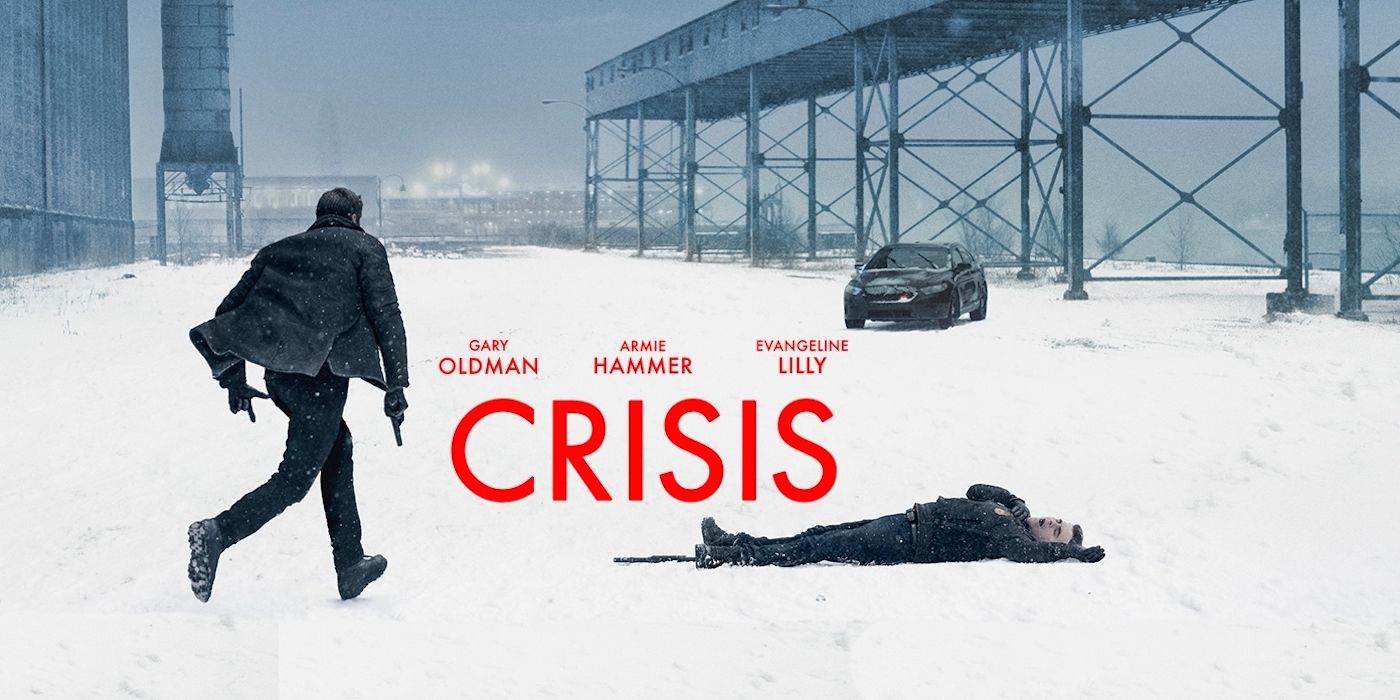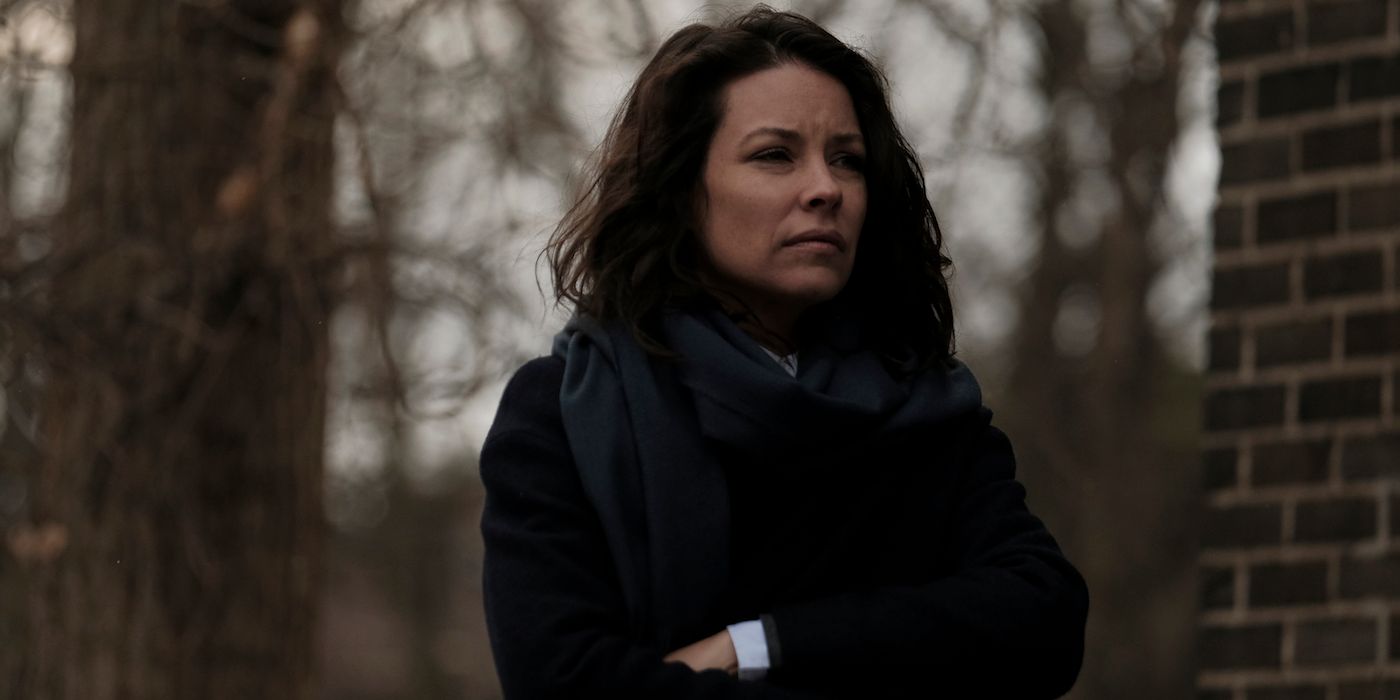The ongoing opioid epidemic has been examined in films like Josh Stewart's Back Fork and the upcoming Netflix series, Painkiller. The latest attempt by Hollywood to explore this public health crisis is the aptly named Crisis, written and directed by Nicholas Jarecki (Arbitrage). The film follows a slew of characters, from street-level drug dealers, federal agents struggling to apply the law in a lawless situation, and a biologist whistleblower who uncovers a dangerous scheme enacted by Big Pharma to release an unsafe, supposedly less addictive, painkiller onto an unsuspecting public.
With such a varied cast of characters, Crisis is able to explore the opioid epidemic from a variety of angles, seeing how both petty gangsters and corporate criminals are able to profit off the pain and suffering of innocent people who are inclined towards addiction through no fault of their own. To that end, Crisis boasts an all-star cast including Gary Oldman, Evangeline Lilly, Greg Kinnear, Luke Evans, Michelle Rodriguez, Lily-Rose Depp, and Armie Hammer.
While promoting the release of Crisis, writer/director Nicholas Jarecki spoke to Screen Rant about his work on the film and its relevance in the wake of an opioid epidemic that continues to ravage innocent lives. He talks about writing such an all-encompassing drama about the various corners of this particular crime world, and explains how the involvement of Gary Oldman helped to attract some of the film's other big stars. Additionally, the studio shared an exclusive clip of Oldman's character, faced with the apathy and adversity that comes with the uphill battle whistleblowers face when they choose to become champions of the truth over corporate profits.
Crisis releases February 26 in theaters, and On Digital and On Digital and VOD March 5.
First off, I loved the movie, I thought it was fantastic. I thought it was very important. A couple of years ago, I was in the hospital getting my gall bladder out. They cut it out and I was there for eight days, and I had all the morphine and Percocet I could take.
Hmm, good stuff!
And from what I understand, whether you come out with or without a lifelong addiction is dependent so largely on just luck, the luck of the draw. Is there enough oversight or research into what causes people to become addicted to these substances?
Such an excellent question. That's one of the things that inspired me to write the film. I've lost people to the opioid issues in my personal life. I have friends who aren't around anymore. And this is back, ten or fifteen years ago, when not so much was known. When I started writing the film, I linked up with some reporters at the Los Angeles Times who had been looking into the pharmaceutical companies and their research process in getting some of these painkillers approved through the FDA. And there was an idea that there was information that showed that, as you observed from your own personal experience, everybody's body reacts differently to these drugs. Some people can take a painkiller, oxycodone, morphine, whatever it is, they take it for 20 days, 30 days, no problem, they go off it, great. But somewhere, as much as 20 to 50 percent of average, everyday citizens will take the drug and become dependent because of their brain chemistry, because of their body chemistry. It's just how their particular body is built, just as one man is tall and one man is short. It effects everybody differently. The question is, who knew what when, and were the proper safeguards in place to protect people from what could happen to them, which is they become dependent through no fault of their own. As we explore in the movie, we see Gary Oldman's character, he's a whistleblower, he's a biologist, a researcher working on behalf of a drug company who has a supposedly non-addictive wonder drug... But guess what? Some people might become addicted to this drug. Maybe millions of people. And he's up here on Mount Olympus, while Evangeline Lily's character, Michelle Rodriguez's character, they're in the trenches, fighting the drug war, and that's what happens after people get addicted. So, if you came, Zak, out of the hospital, and you were unlucky enough to have that need, where would you to get the drugs if you couldn't get them anymore? You'd probably go to the street. So a whole gangster industry springs up to service that, a smuggling industry. That's one of the things we wanted to explore.
I'm glad you mentioned Gary, yeah, we're buddies so I call him Gary... He has an Executive Producer credit. Tell me, was he involved on a ground level? What influence did he have over the production with that?
Absolutely. Gary is a wonderful actor. I've admired him for years. We've seen him in True Romance, we've seen him in Darkest Hour, which was right when I met him, here in Hollywood. We had a mutual friend, and I went and met him in Darkest Hour, and we started talking about another project, but I was writing this script at the time, and it really felt urgent. So I said to Gary, "Hold on a second, let's put that on pause. What about this?" Boom. He immediately said, "This is it, this is urgent, we've got to do this one." And so he came onto the project as a producer along with us and said, "You know what? I'll help you. Use my name. Use my involvement to go get the money and attract the other cast." He was instrumental in getting this film together, and he's been a terrific supporter. I don't think it would exist without his faith.
When you're writing and directing these terribly complex, interwoven narrative, that all start in different places within the same ecosystem, this same sphere, and the way they cross in and out of each other... Tell me a little about the challenge of writing that, and when you're writing it, do you have a diagram with red string connecting everything together?
There is a bit of tin-foil hat to the writing process, I must admit! I look at it as a way of... You're sort of excavating the subconscious, or the unconscious mind. So I start out with a notion: Okay, I want to look at the opioid issue. How do I do that? It's terribly complex, as you say. So I have to find a way to simplify it and synthesize it and make it thrilling and emotional. I got the idea of these characters on my mind... You know, Gary's character, Evangeline, Kinnear, whoever. I had all these different storylines, and now I have to figure out, what would happen here, what would happen here? So I got the stories individually, and I write down a little outline of the story. Then I start merging them together. But this is only one step of the journey. Then I start to generate a script draft. Then I go to Gary Oldman, and I go to the actors, and I say, "Okay, how would you look at this? You're a great student of human nature." And they come in with their ideas and say, "No, it wouldn't happen like that. Wouldn't he go, first, to the place and ask..." Oh my God, I left that out! So an actor can really do, in an hour, what would take you a week sitting in a dark room, because you've lost perspective. Now you get your perspective. This only enhances the script. This was the process the great director Sidney Lumet used. Dog Day Afternoon and other films, with Al Pacino, he would tape conversations with the actors and then integrate that into the script. Okay, now we've beefed up the script, now we go out to shoot. All these great things happen while we're shooting, moments we never expected. Now we've got the footage, we've got the gold bars, hopefully. Now we go back to the editing room. We were on the editing room on this one for seven months! Trying... I had my friend Taika coming in, the director, I had Marc Forster, Eli Roth, all these people, working with my editors, giving me an editor, we'd have different machines running in different room, cutting, trying different things... There's a process of trial and error to it. In the end, it looks all integrated. But if you came in here, you would see the tinfoil hat with the red lines and the boards and the madness. You know, but that's the job. That's why we're here, ultimately, to hopefully give you a good experience. There was a lot of behind-the-scenes hamsters to get you there!
I'm thinking about, when you're writing these characters, and I won't spoil anything in the movie... But some characters have better endings than others. Not better as in, objective, but better as in just their status in the world. I'm wondering about, as a writer, when do you to take pity on a character and give them a "win," and when do you go, "Sorry, but for the story, you've gotta... X." You know?
That's a great question, Zak. I think there's an organic process to it. I think, with a film like this, if everything had a happy ending, then it wouldn't quite feel right. At the same time, if everything had a terrible ending, people would go, "Oh, gee, did I really need to see that?" So what I really wanted to do was inspire some hope with this story. Here you have three main characters, and they're all kind of everyman, everywoman, but they find themselves in extraordinary circumstances. The question becomes, what will they do and how far will they go to get what they want? In this case, I think their motives are pretty pure. They want to help society, they want to solve the mystery of the wrong that's been done. Through the course of that, just like in our own lives, we have to lose things, we have to go through pain. But in the end, hopefully we come out on top. I mean, I hope that's where you and I end up, and I have the same hope for my characters, so I leave the door open. They don't get everything. They don't get quite what they want, but perhaps they get what they need. That's the type of film I like.
I like that it's a film that explores this oppressively cynical world, but it does shine a ray of hope, it has an uplifting idealism to it. I think we need a little bit more of that right now. So thank you for that, thank you for the movie, and it has been a delight to get to talk to you.
Crisis releases February 26 in theaters, and On Digital and On Digital and VOD March 5.



